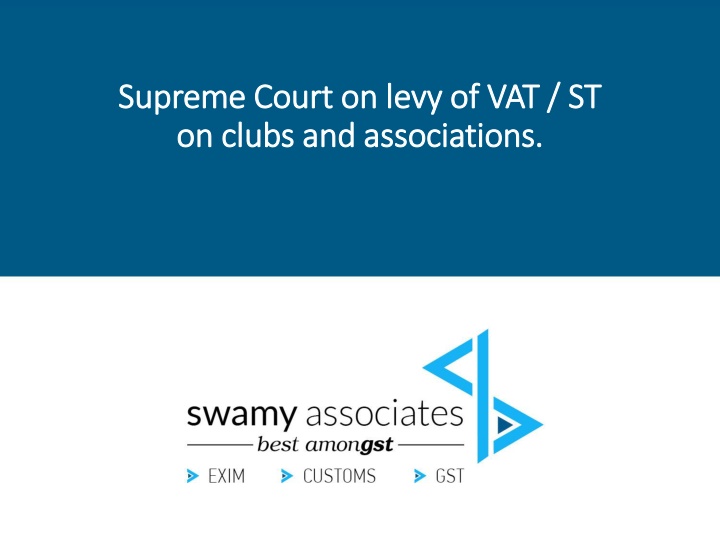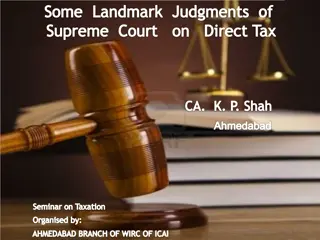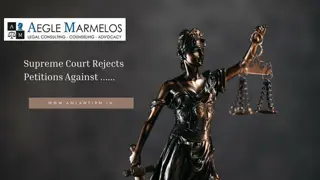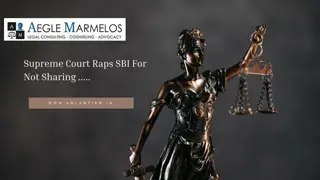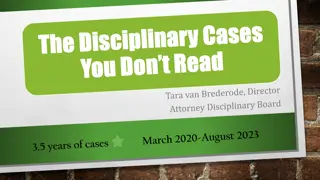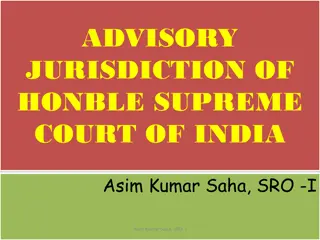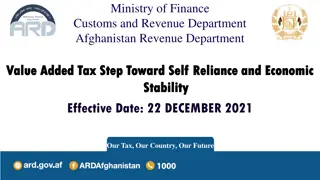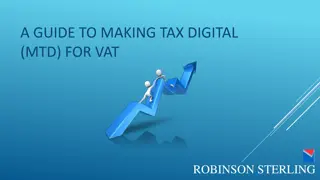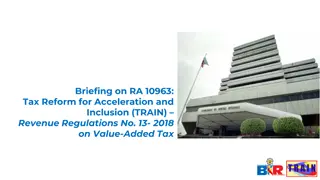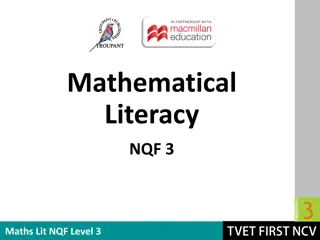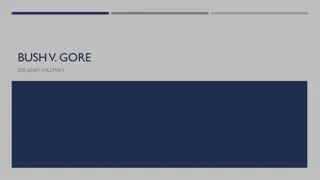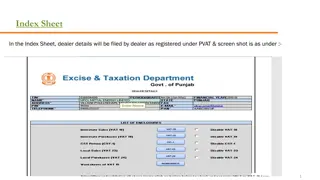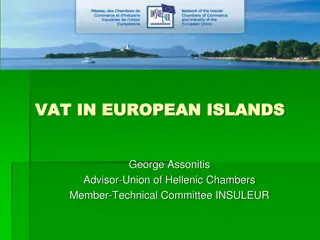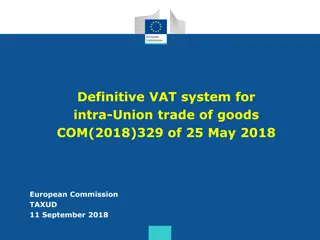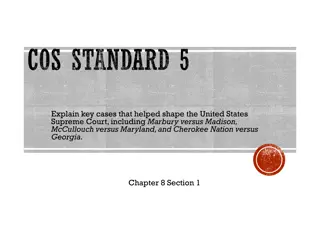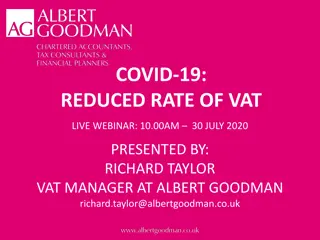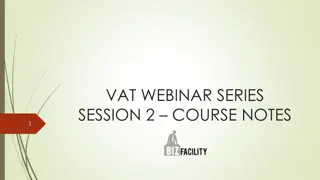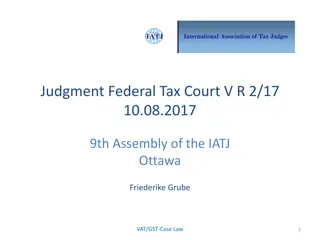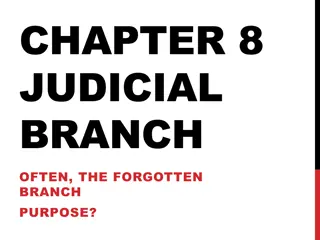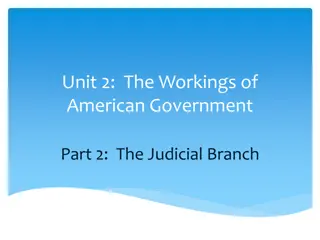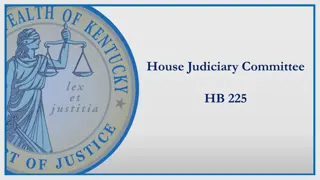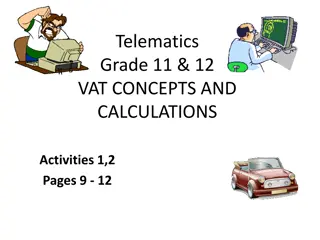Supreme Court on Levy of VAT/ST and Revenue Generation Efforts Post-Independence
While the Supreme Court's rulings on the levy of VAT/ST on clubs and associations post-independence sparked concerns about thwarting government revenue generation efforts, landmark cases like New India Sugar Mills Ltd. vs CST addressed issues such as involuntary sales and works contracts. The Young Men's Indian Association case highlighted the doctrine of mutuality, shaping legal interpretations around joint ownership of club properties. Despite the Law Commission's stance and the 46th Amendment's inclusion of Article 366(29A) for taxation definitions, the complexity of tax laws within these contexts remains a subject of legal scrutiny.
Download Presentation

Please find below an Image/Link to download the presentation.
The content on the website is provided AS IS for your information and personal use only. It may not be sold, licensed, or shared on other websites without obtaining consent from the author.If you encounter any issues during the download, it is possible that the publisher has removed the file from their server.
You are allowed to download the files provided on this website for personal or commercial use, subject to the condition that they are used lawfully. All files are the property of their respective owners.
The content on the website is provided AS IS for your information and personal use only. It may not be sold, licensed, or shared on other websites without obtaining consent from the author.
E N D
Presentation Transcript
Supreme Court on levy of VAT / ST Supreme Court on levy of VAT / ST on clubs and associations. on clubs and associations.
Post independence, revenue generation efforts of Post independence, revenue generation efforts of the Government was feared being thwarted by the the Government was feared being thwarted by the Courts Courts
New India Sugar Mills Ltd. Vs CST (Involuntary sales) State of Madras Vs Gannon Dunkerly (Works contract) K.L. Johar & Co VS CTO (Hire purchase) A.V. Meiyappan Vs CCT (Right to use) CTO Vs Young Men s Indian Association (Mutuality) Northern India Caterers Vs Governor of Delhi and State of Punjab Vs Associated Hotels of India (Hotels and restaurants)
Young Mens Indian Association case Young Men s Indian Association case & the Doctrine of Mutuality & the Doctrine of Mutuality Cosmopolitan Club Sec. 25 Company. YMIA Society. Lawley Institute Trust. "I think the true construction of the rules is that the members were the joint owners of the general property in all the goods of the club, and that the trustees were their agents with respect to the general property in the goods".
61 61st stLaw Commission report Law Commission report Did not suggest any change in law to overcome YMIA for the reasons: The number of such clubs and associations would not be much. It would discourage co-operative movement. There is no scope for any evasion. But Govt. felt otherwise and introduced sub-clause (29A) (e) in Article 366 of the Constitution.
46th thAmendment Amendment Article 366 (29A) Article 366 (29A) 46 tax on the sale or purchase of goods includes (a) a tax on the transfer, otherwise than in pursuance of a contact, of property in any goods for cash, deferred payment or other valuable consideration; (b) a tax on the transfer of property in goods (whether as goods or in some other form) invoked in the execution of a works contract; (c) a tax on the delivery of goods on hire purchase or any system of payment by instalments; (d) a tax on the transfer of the right to use any goods for any purpose (whether or not for a specified period) for cash, deferred payment or other valuable consideration; (e) a tax on the supply of goods by any unincorporated association or body of persons to a member thereof for cash, deferred payment or other valuable consideration; (f) a tax on the supply, by way of or as part of any service or in any other manner whatsoever, of goods, being food or any other article for human consumption or any drink (whether or not intoxicating), where such supply or service, is for cash, deferred payment or other valuable consideration, and such transfer, delivery or supply of any goods shall be deemed to be a sale of those goods by the person making the transfer, delivery or supply and a purchase of those goods by the person to whom such transfer, delivery or supply is made;
Article 366 (29A)(e) Article 366 (29A)(e) a tax on the supply of goods by any unincorporated association or body of persons to a member thereof for cash, deferred payment or other valuable consideration It talks only about unincorporated association or body of persons and not incorporated clubs. Statement of Objects and Reasons says that incorporated clubs are already liable to Sales tax which is contrary to YMIA decision.
Whether the doctrine of mutuality Whether the doctrine of mutuality overcome by 366 (29A)(e)? overcome by 366 (29A)(e)? State of West Bengal Vs Calcutta Club Example given by the SC Sec. 44 of the IT Act. 44. Insurance business.-Notwithstanding anything to the contrary contained in the provisions of this Act relating to the computation of income chargeable under the head "Interest on securities", "Income from house property", "Capital gains" or "Income from other sources", or in section 199 or in sections 28 to 43B, the profits and gains of any business of insurance, including any such business carried on by a mutual insurance company or by a co- operative society, shall be computed in accordance with therules contained in the First Schedule.
Conclusions of the SC. Conclusions of the SC. (i) The doctrine of mutuality continues to be applicable to incorporated and unincorporated members clubs after the 46thAmendment adding Article 366(29-A) to the Constitution of India. (ii) Young Men s Indian Association and other judgments which applied this doctrine continue to hold the field even after the 46thAmendment. (iii) Sub-clause (f) of Article 366(29-A) has no application to members clubs.
On Service Tax On Service Tax Ranchi Club Ltd case & Sports Club of Gujarat case. Doctrine of mutuality applied and demands set aside by the HCs. On appeal, the HC decisions have been upheld by the SC, vide the common order.
Effect on Service Tax Effect on Service Tax 16.05.2005 to 30.06.2012 16.05.2005 to 30.06.2012 club or association means any person or body of persons providing services, facilities or advantages, for a subscription or any other amount, to its members, but does not include- (i) anybody established or constituted by or under any law for the time being in force. From 01.05.2011 coverage extended to services to non members also.
Effect on Service Tax Effect on Service Tax 16.05.2005 to 30.06.2012 16.05.2005 to 30.06.2012 Sec. 65 of the Finance Act, 1994. Explanation: For the purposes of this section, taxable service includes any taxable service provided or to be provided by any unincorporated association or body of persons to a member thereof, for cash, deferred payment or any other valuable consideration. Incorporated entities are not at all covered under the levy.
Effect on Service Tax Effect on Service Tax 01.07.2012 to 30.06.2017 01.07.2012 to 30.06.2017 Sec. 65 B (44) of the Finance Act, 1994. Explanation 3. For the purposes of this Chapter;- (a) an unincorporated association or a body of persons, as the case may be, and a member thereof shall be treated as distinct persons. Incorporated entities are not at all covered under the levy.
STATUS VAT SERVICE TAX (16.06.2005 TO 30.06.2012) SERVICE TAX (01.07.2012 TO 30.06.2017) INCORPORATED CLUBS & ASSOCIATIONS NOT LEVIABLE NOT LEVIABLE NOT LEVIABLE UNINCORPORATED CLUBS AND ASSOCIATIONS NOT LEVIABLE NOT LEVIABLE* ???** * No specific discussion about unincorporated clubs in the judgement as both the appeals involved are of limited companies. In para 79 it is observed that the Explanation in Service Tax are similar to Art. 366 (29A) and hence the above inference could be drawn as the Explanation under Sec. 65 cannot overcome doctrine of mutuality. ** The language of Explanation under Sec. 65 B (44) has the effect of overcoming the doctrine of mutuality.
GST Scenario. GST Scenario. AAR MAHARASHTRA DECISIONS IN LIONS CLUB & ROTARY AAR MAHARASHTRA DECISIONS IN LIONS CLUB & ROTARY CLUB CLUB
GST Scenario. GST Scenario. Article Article 246 tax tax. . ( (1 1) ) Notwithstanding Notwithstanding anything Parliament, Parliament, and and subject have have power power to to make imposed imposed by by the the Union 246A A. . Special Special provision provision with with respect respect to to goods goods and and services services anything contained contained in in articles subject to to clause clause ( (2 2), ), the make laws laws with with respect respect to to goods Union or or by by such such State State. . articles 246 Legislature of of every goods and and services 246 and every State, services tax and 254 State, 254, , the Legislature tax ( (2 2) ) goods goods and both both takes Parliament Parliament has and services services tax takes place place i in n the has exclusive exclusive power tax where where the the course course of of inter power to to make the supply supply of of goods, inter- -State State trade make laws goods, or or of of services, trade or or commerce commerce. . laws with with respect respect to to services, or or
GST Scenario. GST Scenario. Supply not defined in Constitution. Section 7 of the CGST Act, 2017 deals with Scope of supply . SECTION 7. Scope of supply. (1) of this Act, the expression supply includes (a) all forms of supply of goods or services or both such as sale, transfer, barter, exchange, licence, rental, lease or disposal made or agreed to be made for a consideration by a person in the course or furtherance of business; (d) the activities to be treated as supply of goods or supply of services as referred to in Schedule II. For the purposes
GST Scenario. GST Scenario. SCHEDULE II Activities or transactions to be treated as supply of goods or supply of services 7. Supply of Goods The following shall be treated as supply of goods, namely : Supply of goods by any unincorporated association or body of persons to a member thereof for cash, deferred payment or other valuable consideration.
GST Scenario. GST Scenario. Clause (d) of Section 7(1) has been omitted with retrospective effect from 01.07.2017. Sub section (1A) of Section 7 introduced with retrospective effect from 01.07.2017. (1A) where certain activities or transactions, constitute a supply in accordance with the provisions of sub-section (1), they shall be treated either as supply of goods or supply of services as referred to in Schedule II.
GST Scenario. GST Scenario. So the purpose of Schedule II is only to clarify whether a particular supply is supply of goods or supply of services. Hence, supply is important. There is nothing to overcome the doctrine of mutuality. Prior to insertion of sub-Section 7 (1A), there was scope to say that the doctrine of mutuality has been overcome vide S.No. 7 of Schedule II.
GST Scenario. GST Scenario. No GST is leviable on incorporated or unincorporated clubs or association!
Way forward Way forward To claim refund of taxes already paid? - Unjust enrichment. - Time bar. - Fear of retrospective amendment. Stop paying GST? - Fear of Retrospective amendment.
THANK YOU THANK YOU G. Natarajan, Advocate, Swamy Associates G. Natarajan, Advocate, Swamy Associates 93400 54477 93400 54477 nuts@ nuts@swamyassociates.com swamyassociates.com
